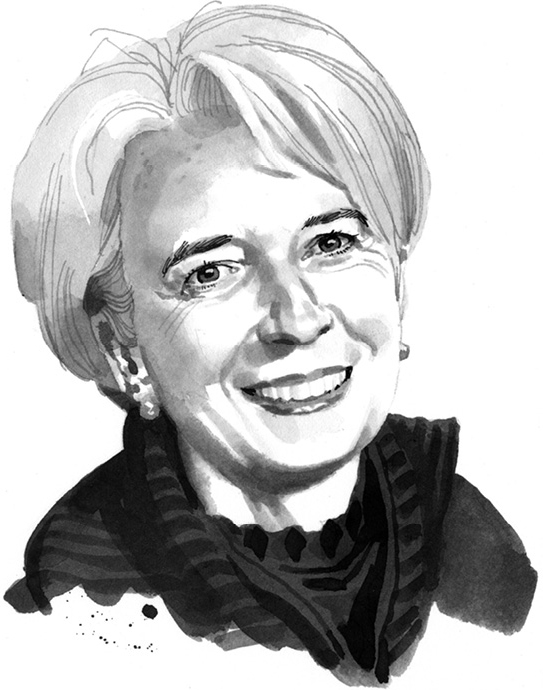
CHRISTINE LAGARDE
President, European Central Bank; Former Managing Director, International Monetary Fund
“There are still instances when I walk into a room full of men and there is this little smile about their face, which is either ‘Here she goes again, she’s going to talk about women,’ or ‘I wonder what she has to say.’ It’s less now, for sure, but when you are in a minority, that’s what you experience.”
Christine Lagarde was for eight years the managing director of the International Monetary Fund (IMF), a Washington-based organization created after World War II with the goal of ensuring international financial stability and economic growth. As director, Lagarde frequently had to deal with the world’s financial crisis of the moment: debt defaults in Argentina and Greece, the impact of a post-Brexit Europe, declining growth rates in many emerging and frontier markets.
In addressing these kinds of issues, and in running the sprawling IMF bureaucracy, she invariably was able to get many disparate parties on the same page because of the power of her intellect, the force of her personality, and her considerable charm. She left this position in late 2019 to become the president of the European Central Bank, a somewhat less global organization but with an enormous role in guiding the European economy. Prior to the IMF position, she was the French minister of finance and the managing partner of the multinational law firm—then the world’s largest—Baker McKenzie.
Lagarde was the first woman to hold all of those positions. As such, she was both a trailblazer and a role model for women throughout the world. More than just holding these positions, she provided the type of strong, decisive leadership that some thought only a man could provide.
What was the secret to the repeated leadership successes of a French lawyer, who as a youth also showed leadership in a totally different setting as a member of the French national synchronized swimming team? How did Lagarde overcome the frequent discrimination she encountered? She not only held positions that had always been filled by men, but she also found few female coworkers along the way.
I asked these and related questions at a Peer to Peer session at the IMF headquarters in Washington, D.C., in September 2018. In the interview, she does not attribute her professional successes and leadership skills to any one factor. But I think it is fair to say that her considerable intellect, self-confidence, and hard-work mind-set are important factors. Too, while she might not say so directly, she probably feels that being underestimated at the outset—and then being able to show her evident skills quickly—has enabled her to achieve success few expected.
For instance, she came to lead the IMF at a time when her predecessor had to resign amid a personal scandal. The IMF’s basic credibility and effectiveness were being questioned. By the time she left, Lagarde had restored and enhanced the credibility of the IMF to a level not even imagined by its creators in the post–World War II period.
I spoke at her IMF farewell dinner and said, rather tongue in cheek, that her success might also be attributed to the skills she had learned as a synchronized swimmer, and that perhaps everyone in Washington interested in leading a large organization might begin by learning synchronized swimming. There must be something learned in that sport that is exceedingly valuable later in life.